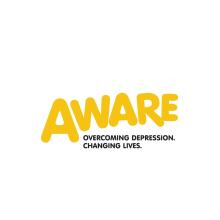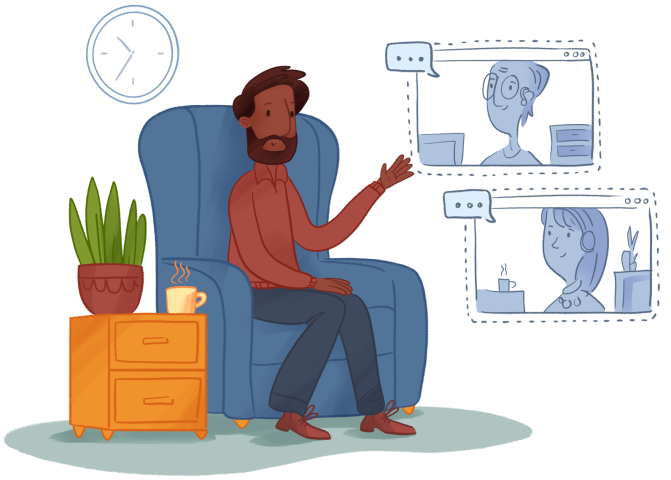
Take 5 steps to wellbeing
Five simple steps that can help maintain and improve mental wellbeing.

Most people know when they are mentally and physically well, but sometimes people need a little extra support to keep well.
There are five simple steps to help maintain and improve a person’s wellbeing: connect, keep learning, be active, take notice, and learn.
Evidence indicates a person who practises all five steps as part of their daily routine will feel higher levels of wellbeing.
You can motivate and support people to 'have a go’ and embrace the Take 5 steps to wellbeing, and you can also use the steps to support yourself.
Connect
 Connect with others: family, friends, colleagues and neighbours at home, work, school or in the local community. Building connections will support and enrich a person every day.
Connect with others: family, friends, colleagues and neighbours at home, work, school or in the local community. Building connections will support and enrich a person every day.
Social relationships are important to support wellbeing and to act as a buffer against mental ill health. Connecting and interacting with others can have a positive benefit to wellbeing.
Tips for connecting
- Phone, message, email or text.
- Eat a meal together.
- Join a support group (online or in person).
- Connect with nature, pets or animals.
- Connect with your spiritual needs.
Keep learning
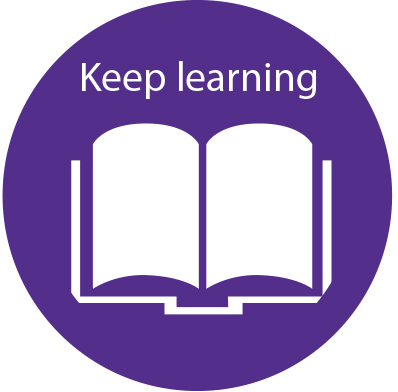 Don’t be afraid to try something new, rediscover an old hobby or sign up for a course. Take on a different responsibility, fix a bike, learn to play an instrument or how to cook your favourite food. Set a challenge you will enjoy. Learning new things will make you more confident, as well as being fun to do.
Don’t be afraid to try something new, rediscover an old hobby or sign up for a course. Take on a different responsibility, fix a bike, learn to play an instrument or how to cook your favourite food. Set a challenge you will enjoy. Learning new things will make you more confident, as well as being fun to do.
Learning, remaining curious and setting goals are important for all ages. For children, it leads to positive cognitive and social development. For adults, learning includes elements of goal-setting, which is strongly associated with higher levels of wellbeing.
Tips for learning
- Ask someone to teach you how to do something or find out about a topic that interests you.
- Sign up for a local course or class.
- Search the internet for information, tips or online courses.
- Visit your local library.
- Visit a museum or exhibition.
- Ask someone a question about themselves.
Be active
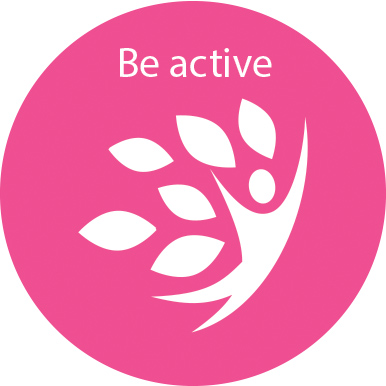 Go for a walk or run, cycle, play a game, garden or dance. Exercise makes you feel good. Most importantly, discover a physical activity you enjoy; one that suits your level of mobility and fitness.
Go for a walk or run, cycle, play a game, garden or dance. Exercise makes you feel good. Most importantly, discover a physical activity you enjoy; one that suits your level of mobility and fitness.
Research shows a strong correlation between physical activity and increased wellbeing, as well as lower rates of depression and anxiety. It is essential for people of all ages and has been shown to slow age-related cognitive decline.
Tips for being active
- Do exercises in a chair or lying down if needed.
- Join a club with others.
- Fit activity into your daily routine:
- get off the bus a stop early and walk;
- swap the lift for the stairs;
- meet a friend for a walk instead of a coffee.
Take notice
 Stop, pause or take a moment to look around you. What can you see, feel, smell or even taste? Look for beautiful, new, unusual or extraordinary things in your everyday life and think about how that makes you feel.
Stop, pause or take a moment to look around you. What can you see, feel, smell or even taste? Look for beautiful, new, unusual or extraordinary things in your everyday life and think about how that makes you feel.
Developing skills that increase awareness of what is immediately happening, both physically and mentally, within and around us can improve our wellbeing.
Tips for taking notice
- Take photos of the seasons changing.
- Practise slow breathing.
- Try a task you need to focus on, such as crochet or mindful colouring in.
- Notice your thoughts and feelings.
- Savour the taste of your food.
- Before bed ask yourself: What did I do well today? What was good today?
- Take the 'beautiful things challenge' and have a competition with family or friends:
- How many beautiful things can you notice today? (such as a beautiful sky, a kind stranger, a child's laugh)?
Give
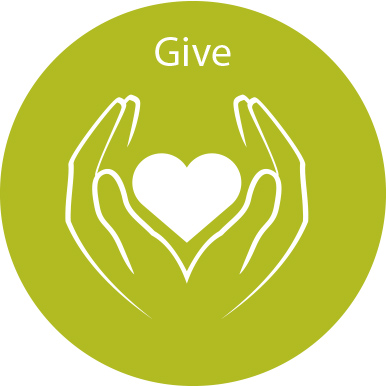 Do something nice for a friend or stranger, thank someone, smile, volunteer your time or consider joining a community group. Look out as well as in. Seeing yourself and your happiness linked to the wider community can be incredibly rewarding and will create connections with the people around you.
Do something nice for a friend or stranger, thank someone, smile, volunteer your time or consider joining a community group. Look out as well as in. Seeing yourself and your happiness linked to the wider community can be incredibly rewarding and will create connections with the people around you.
Giving is more than just the sharing of materialistic things with others. It is about cultivating a spirit of generosity and promoting active participation in social and community life.
Tips for giving
- Give a smile, a compliment, encouragement.
- Give a hand.
- Encourage others to Take 5 (maybe arrange activities for children or older people).
- Give your time, a silent wish or prayer.
- Give thanks (be grateful for the good in your life).
Useful resources
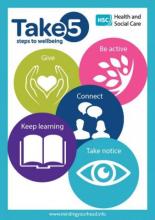
Take 5 steps to wellbeing (English and translations)
This leaflet and poster outline five simple ways people can maintain and improve their mental wellbeing. Translations into 12 languages are available.
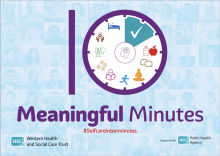
Western Trust 10 meaningful minutes
This pack highlights the importance and benefits of self-care. These needs could include physical, emotional, relationship and social needs.






